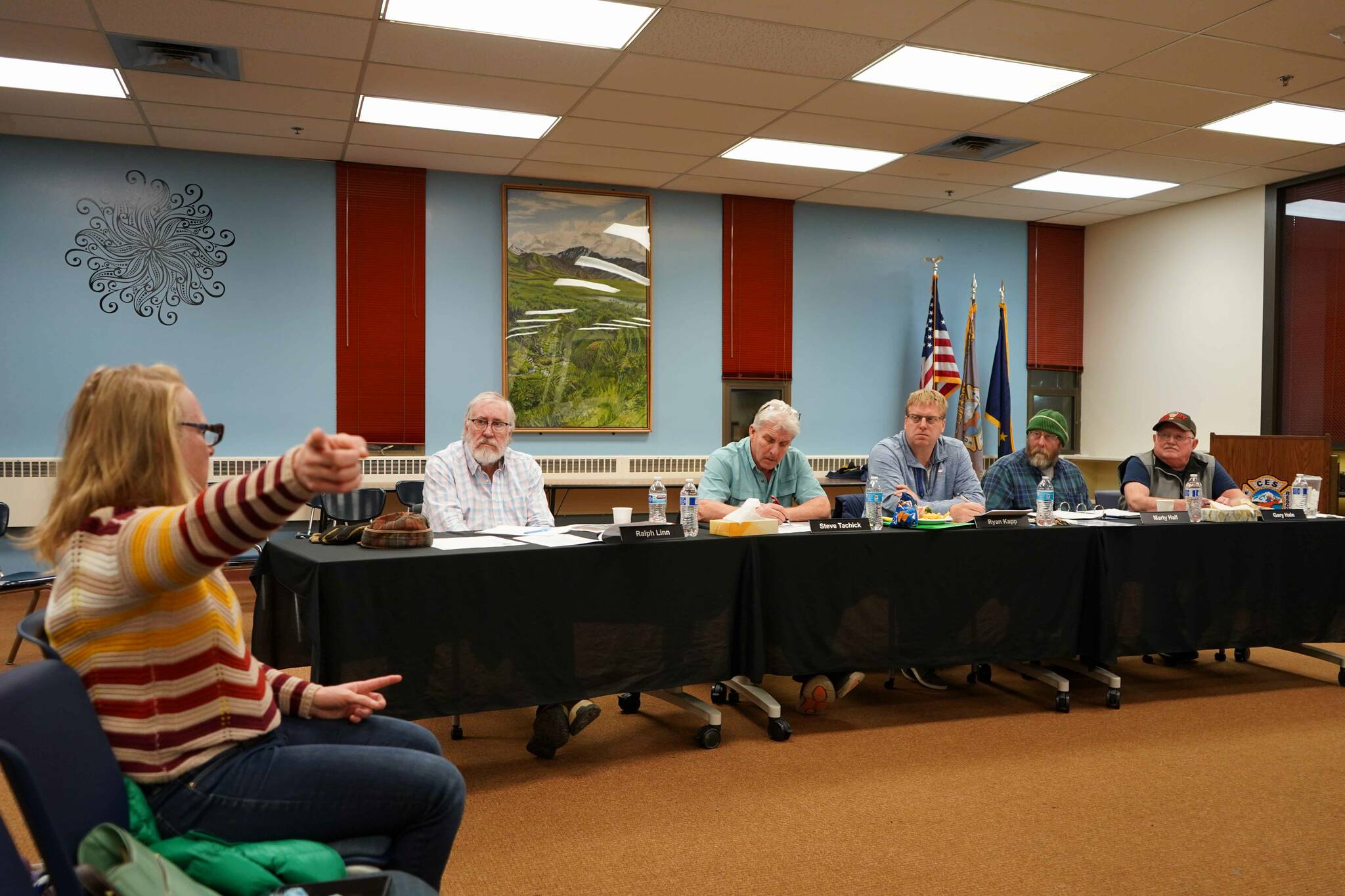At a meeting of the Central Emergency Service Area Board of Directors on Thursday, around 20 people showed up in support of a board effort to ask for full staffing of CES Station #6 in Kasilof. CES Chief Roy Browning said during the meeting that the station is currently staffed by a 40-hour fire captain and otherwise relies on volunteer efforts.
“We cannot guarantee that there’s full-time staffing at the Kasilof station,” he said.
After public testimony from around a dozen people, the board chose without objection to ask for four additional full-time positions at the station, though CES Chief Roy Browning noted that the process to add them — even if successful — would stretch into next summer.
A personnel request has to go the borough mayor by Dec. 2, Browning said, in hopes of making it into the budget for the next fiscal year. A decision on the request would be made by Jan. 24, after review by the mayor, finance director and human resources. The change would come up to the service area board again in March, and if then supported would require action by the Kenai Peninsula Borough Assembly by June.
“It is a long process,” Browning said.
The conversation represents “routine business that became a hot ticket item,” Chair Ryan Kapp said after the meeting. The issue of staffing at the Kasilof station was raised at the board’s Sept. 19 and Oct. 17 meetings as the group looked forward to preparing next year’s budget.
In September, a report to the board said that the station had a “very busy summer,” up 13% year over year in call volume. In October, the group said they’d like to see the conversation of fully staffing the Kasilof station brought up again.
“The call volume continues to go up and there is not an ambulance currently at that station,” meeting minutes read.
During Thursday’s meeting, Browning said adding the four positions to CES would increase their budget by around $600,000, based on an estimate from the finance director. That might require an increase in mill rate.
Borough Mayor Peter Micciche is “in support of it,” Browning said. The cuts to the positions at Kasilof came “two mayor administrations ago,” amid the loss of two major sources of funding.
CES has repeatedly expressed a desire to fully staff all of its stations, Browning said.
The Kasilof station is currently staffed part time, with one 40-hour captain and volunteer staff as available. Manned hours are increased in the busier summertime, Browning said. Adding four full-time staff to the facility would allow for 24-hour coverage.
When calls come in from the Kasilof area, Browning said, ambulances come from Soldotna, Kalifornsky Beach or Sterling.
Public testimony centered repeatedly on the possible wait times for an ambulance.
Jill Garnet said she’s had to call for an ambulance to aid someone experiencing chest pain — who had a history of heart problems — and they had to wait for an ambulance to travel from Soldotna.
“That’s unconscionable.”
Jess Gutzwiler, of Clam Gulch, said that on Oct. 16, 2021, she was struck by a driver entering her lane and was left hanging upside down — “suspended by my seat belt.” A CES volunteer arrived — “he had a very calming presence … and was very exceptional” — but he didn’t have an ambulance. Unsure whether Gutzwiler had internal damage, they decided to wait without moving her. She later needed surgery and now suffers chronic pain.
“I hung in that vehicle for 45 minutes before CES arrived,” she said. “Could all this have been prevented if … he would have had staff firefighters there to support and not rely on the ones coming from Soldotna? As residents of the CES service area, we are already paying the same mill rate — as others have mentioned — and yet we are underserved in staffing the Kasilof station.”
Christy Bullock said she’s lived in Kasilof for roughly four years. For all that time, she said, “I was always under the assumption it was fully staffed.”
Ann Fraser lives near Tustumena Lake and said that the wildfire in her area this summer was a “big wake up call.” She worries that if weather conditions hadn’t been so favorable to the suppression efforts, homes might have been lost. She said she wanted to see 24-hour staffing at Kasilof, even if it means increased taxes to get it.
Dale Walaszek said that waiting for an ambulance that’s 17 miles away puts lives at risk.
Kapp encouraged people to continue voicing their concerns as the effort moves through the regulatory pipeline. He asked them to continue to show up and advocate, at meetings and to their local representatives.
“Plead the case,” he said. “I think it’s pretty clear that it’s not that the administration or the board doesn’t support this. We’d love to have eight firefighters in every station every day. It all comes down to the almighty dollar.”
“We’re putting it in motion here, with this form. We’ll see where we go from here.”
For more information about Central Emergency Services or the CES Area Board of Directors, visit kpb.us/service-areas/ces.
Reach reporter Jake Dye at jacob.dye@peninsulaclarion.com.

